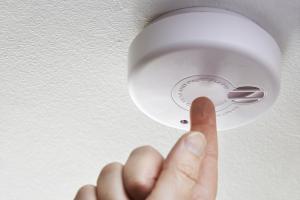Think about fire safety over the festive period
Date published:

Extra fire risks at Christmas
Don't become complacent about fire safety. You should:
- have a working smoke alarm fitted on all levels of your property
- test your smoke alarm(s) every week
- make sure to replace the battery or the smoke alarm if it isn't working
- have a working carbon monoxide alarm
Christmas is a time when extra fire hazards are in the home, including:
- candles
- portable heaters - make sure they’re in good working order
- open fires - get someone suitably trained to service your chimney before you light it to make sure it’s not blocked
- Christmas tree lights
- overloaded sockets
If you're trying to reduce heating costs this winter, keep warm safely.
Reduce the risk of fire
To reduce the risk of fire over the festive period, you should:
- check that your Christmas lights conform to the British Standard
- never use lights with worn or frayed cables
- turn off lights and unplug sockets at night or when you're leaving the house
- never overload electrical sockets
- plug high-powered electrical appliances such as electric heaters directly into a wall socket
- keep heaters away from soft furnishings and decorations
- never place candles near your Christmas tree, decorations, wrapping paper, or furnishings
- put candles in a purpose-made holder and on a heat-resistant surface
- never put candles under shelves
- never leave burning candles unattended and make sure they're out of reach from children and pets
- keep lighters and matches out of the reach of children
- never attach decorations to lights or heaters
- never leave a cooker unattended
- switch off cooking appliances after use
- avoid cooking while under the influence of alcohol
- keep flammable items such as oven mitts, tea towels, and cables away from the cooker top
- make sure cigarettes are completely stubbed out and never smoke in bed
You should:
- make a fire escape plan
- discuss it with your family
and
- keep your escape routes clear
Make sure any visiting family and friends are aware of the fire escape plan and tell them where you keep door keys.
You can find out more about fire safety at the following links:
You should try and celebrate Christmas and New Year safely – the risk of accidents is greater after drinking alcohol.
If a fire starts
Never be tempted to tackle a fire in your home and plan how to escape safely.
If a fire starts:
- get everyone out of the property
- close all doors behind
- stay out
- phone 999
Older or vulnerable people
Check in with older family, friends, neighbours and those who are isolated in the community.
Make sure they have a working smoke alarm.
Advise them of steps they can take to help ‘STOP’ fire in their home.
If you're worried about the fire safety of someone in your community you can:
- fill out a free Home Fire Safety Check
or
- phone 028 9266 4221 to ask for an in-person check
If you hear a neighbour’s smoke alarm going off, don’t ignore it - go and check.
If there’s a fire, or if you can’t be sure, phone 999.